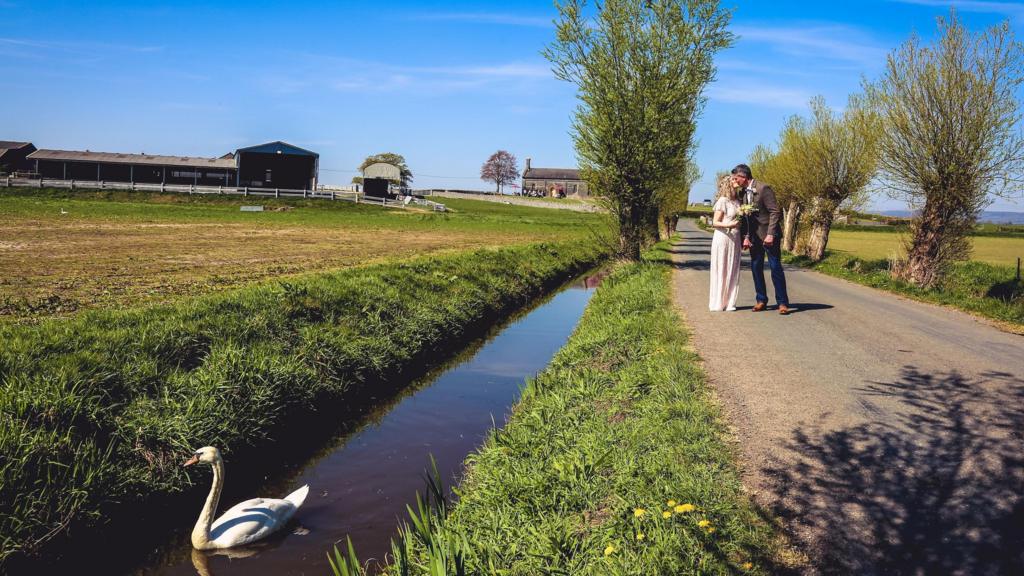British farmers have endured a challenging year, marked by the most extensive wet winter and the driest spring on record.
Simultaneously, the Labour government’s imposition of inheritance taxes on farms has ignited nationwide protests, further exacerbated by the abrupt cancellation of grants for sustainable farming initiatives.
A significant 75% of farmers now depend on non-agricultural ventures to supplement their income from food production. These diverse enterprises, ranging from falconry and helicopter tours to spas and solar farms, have become integral to their business models.
We spoke with several farmers to understand their strategies for maintaining their family businesses.
Mike Churches, a sixth-generation farmer near Glastonbury, Somerset, described the farm’s income as “atrocious,” prompting diversification. His revenue from weddings and events now significantly surpasses that from sheep and cattle farming.
He explained: “It’s about 30% from farming now, 70% from weddings, falconry, helicopter rides, glamping—you name it.”
Tom Collins, Wiltshire chairman of the National Farmers’ Union (NFU), emphasized the critical role of these supplementary businesses.
“It’s no longer an add-on, but a vital component of the business,” he stated.
Many farms have incorporated wedding venues, but few possess an on-site church. Near Glastonbury, the village of Godney, once home to a deconsecrated church adjacent to Godney Farm, provided a unique opportunity.
Mr. and Mrs. Churches purchased the building, restoring it and securing a license for civil ceremonies. “Yes, plenty of people tell us we have the right name,” Mr. Churches chuckled.
This coincided with a decline in income from traditional farming activities. Mr. Churches noted his return on investment from farming is “about 2 or 3%, which is nonsensical for the hours involved,” while weddings provide tenfold the profit.
Last year, 34 couples wed at Godney Farm, including Paul and Michelle Chorley. Mr. Chorley explained their choice: “We’re outdoorsy people, and wanted a country setting. The view was exactly what we imagined.”
Mrs. Chorley added: “It was relaxed, children and dogs were running around, sheep and cows nearby—perfect.”
While the Churches’ situation is unique, supplementary income is widespread. Government research indicates that 26% of farms derive over half their income from diversified enterprises.
Another example is Michelle Stead’s beauty salon, “Perfection,” located on a working farm in north Wiltshire. Its rural setting, she believes, is a key attraction.
“No parking issues, no traffic, no pollution, it’s beautiful,” she said. “It sets the scene and makes us different.”
Her landlord, Tom Collins, exemplifies the trend. While operating a traditional farm, he rents out unused buildings to small businesses, stating, “Without diversification, we’d struggle. I don’t know a single farm that isn’t diversified.”
Government research confirms this, showing 71% of farmers rely on additional income streams, up from 61% in 2015. Common supplementary activities include property rentals, farm shops, B&Bs, and tourism-related ventures. Solar power partnerships are also emerging.
The report highlighted the dependence on these secondary incomes, revealing that 28% of farms reported negative income from core farming activities—essentially losing money producing food.
Mr. Collins attributes this diversification to the precarious nature of food production: “The finances aren’t good, the margins are wafer-thin. It’s a lot of sawing for not much sawdust.”
Government ministers assert unwavering support for farmers, with a DEFRA spokesperson stating: “This government is investing £5bn into farming, the largest budget for sustainable food production in our country’s history.”
Follow BBC Somerset on Facebook and X. Send your story ideas to us on email or via WhatsApp on 0800 313 4630.
Farm union says changes announced last October have put vulnerable people in the eye of the storm.
Yunqing Jian and Zunyong Liu allegedly brought into the US a fungus which damages a variety of crops and is toxic to humans and animals.
More than 100,000 are expected to attend the event at Wadebridge between 5 and 7 June.
Campaigner Sam Beckinsale wants to see workplaces adopt domestic abuse policies to support staff.
The annual Royal Bath and West Show has been taking place in Shepton Mallet.

